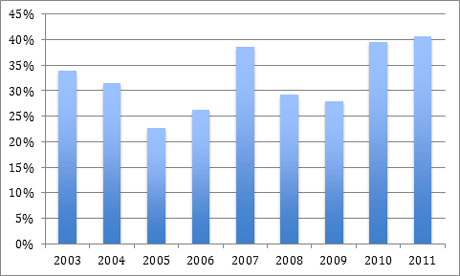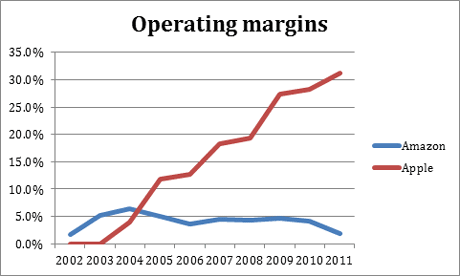Forget Amazon - buy Apple shares instead
The markets reacted poorly to Amazon.com's latest results. But its shares are still overpriced. So if you want to buy a tech stock, says Phil Oakley, forget Amazon and try Apple instead.
Get the latest financial news, insights and expert analysis from our award-winning MoneyWeek team, to help you understand what really matters when it comes to your finances.
You are now subscribed
Your newsletter sign-up was successful
Want to add more newsletters?

Twice daily
MoneyWeek
Get the latest financial news, insights and expert analysis from our award-winning MoneyWeek team, to help you understand what really matters when it comes to your finances.

Four times a week
Look After My Bills
Sign up to our free money-saving newsletter, filled with the latest news and expert advice to help you find the best tips and deals for managing your bills. Start saving today!
The market has just given a big thumbs down to Amazon's trading performance. Is this the beginning of the end of the stock market's love affair with Amazon - or are investors overreacting?
Sales up, profits down
So what spooked investors?
Amazon (Nasdaq:AMZN) revealed that it had grown its sales by 35% in the last three months, and by 41% in the last year. This was lower than most Wall Street analysts had expected. As a result, the shares fell nearly 9% in after-hours trading.
MoneyWeek
Subscribe to MoneyWeek today and get your first six magazine issues absolutely FREE

Sign up to Money Morning
Don't miss the latest investment and personal finances news, market analysis, plus money-saving tips with our free twice-daily newsletter
Don't miss the latest investment and personal finances news, market analysis, plus money-saving tips with our free twice-daily newsletter
Meanwhile, fourth quarter operating profits fell by 45% to $260m. Now, that's not as bad as it sounds, as some had thought Amazon might make a loss.
However, for the current quarter, the company is forecasting sales growth of between 22% and 36%, and an operating profit range between a potential loss of $200m to a profit of $100m that wide a range isn't confidence-boosting for your average shareholder.
Amazon.com annual sales growth

Amazon's big problem
At the moment, there seems to be no let up of Amazon's dominance of the traditional retail market: sales of electronics and general merchandise grew by 56% year-on-year. In other words, it's still wiping the floor with the high street.
Amazon's problem seems to rest with the new battleground of digital media music, books, films and apps' (software applications). The fact that Amazon's media sales grew by just 8% in North America during the fourth quarter is a major concern.
Of course the market knows that Amazon is investing heavily in its Kindle Fire tablet computer and related content (sales of all Kindle units grew by 177% during the nine weeks to 31 December) and seems prepared to accept lower profits in the short-term with the promise of big pay-offs later.
But sooner or later, Amazon will have to start making money out of its investment before the competition especially Apple (Nasdaq:AAPL) takes a chunk out of Amazon's market share.
Amazon versus Apple
It seems clear that Amazon believes that it needs both content and distribution to succeed. Apple has built an enviable position of competitive strength in a similar way. It profits from both the hardware (with its iPads and iPhones, for example) and the content that goes with it (through the iTunes store).
Amazon has strong positions in books and music and is growing its film and TV offers through its Prime Instant Video service. However, it is having to sell its Kindle tablets the hardware - at minimal profit or even a loss to stay competitive.
Furthermore, if Apple, with a cash pile of nearly $100bn, becomes more aggressive in acquiring prime content then Amazon may have lots of problems.
Amazon's share price is ridiculous and could tank
Of course, from an investment point of view, none of these threats would matter if they were reflected in the share price everything has its price.
Unfortunately, this isn't the case for Amazon. Its valuation is nothing short of stratospheric. Based on Bloomberg consensus forecasts of earnings of $1.61 per share and a share price of $175, Amazon's shares trade on a prospective price / earnings ratio of 108 times, falling to 60 times in 2013 (based on an earnings per share (EPS) forecast of $2.94).
Contrast this with the hugely profitable Apple (see chart below) which trades on less than ten times forward earnings when its large cash pile is excluded.
Given Apple's profits, competitive position and valuation, why on earth would you own Amazon shares at the company's current valuation?

Let's look at Amazon's valuation another way. How much profit would it need to make to trade on a more modest 20 times earnings? At $175 per share it has a market value of $79.6bn giving a required net income of $4bn (about three times higher than current 2013 forecasts).
While there is a lot to like about Amazon as a customer, at the current share price there are lots of risk to investors. If Amazon's share price halved from here it would still be expensive.
Whilst Apple and Amazon have different business models (which makes comparisons slightly difficult), they are both increasingly fighting on the same turf. Given their respective competitive strengths and huge differences in valuation it makes more sense to buy Apple today, while Amazon shares may continue to disappoint.
Get the latest financial news, insights and expert analysis from our award-winning MoneyWeek team, to help you understand what really matters when it comes to your finances.
Phil spent 13 years as an investment analyst for both stockbroking and fund management companies.
-
 How a ‘great view’ from your home can boost its value by 35%
How a ‘great view’ from your home can boost its value by 35%A house that comes with a picturesque backdrop could add tens of thousands of pounds to its asking price – but how does each region compare?
-
 What is a care fees annuity and how much does it cost?
What is a care fees annuity and how much does it cost?How we will be cared for in our later years – and how much we are willing to pay for it – are conversations best had as early as possible. One option to cover the cost is a care fees annuity. We look at the pros and cons.